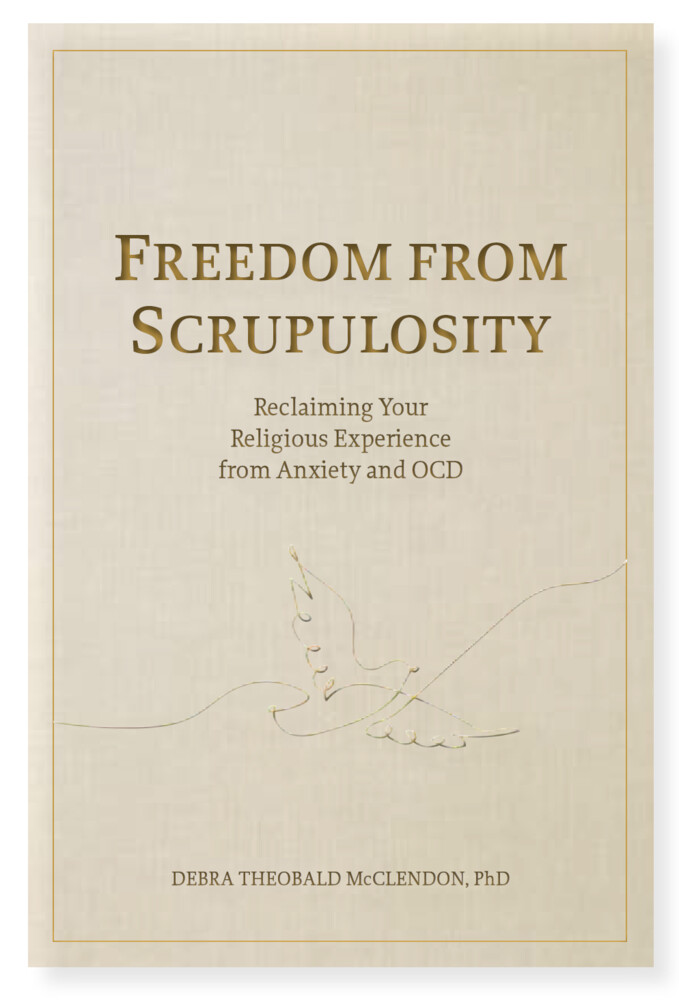At the end of last year, I read something that I still haven’t been able to get out of my mind. It was a description of Obsessive Compulsive Disorder (OCD) that said, “OCD typically latches on to the things that are most important to you and that you feel strongest about, filling your mind with intense doubt.” It turns out this is a frequently used description: OCD attacks the thing that you care the most about.
This definition immediately set a lightbulb off in my head. I’ve seen firsthand how OCD works its way into the things that are most important to people I love. For a singer, OCD might manifest itself through a fear that they will lose their voice, thus leading to compulsions to preserve their voice. For an athlete, it may lead to rituals that they feel must be completed perfectly in order for them to perform—which ironically can take the joy out of the sport they once loved.
Naturally, for a person of deep faith, OCD attacks their relationship with God.
Scrupulosity: Religious OCD
OCD related to religion or morality is known as scrupulosity. It’s a topic that has been written about by philosophers dating back at least as far as 1691, when John Moore described scrupulous individuals as possessing a “fear, that what they do, is so defective and unfit to be presented unto God, that he will not accept it. … Naughty and sometimes blasphemous thoughts, start in their minds, while they are exercised in the worship of God, despite all their endeavors to stifle and suppress them, the more they struggle with them, the more they increase.”
Scrupulosity is not unique to The Church of Jesus Christ of Latter-day Saints. In fact, a 2019 study found that “individuals who identified as Catholic reported the highest level of scrupulosity relative to individuals who identified as Protestant, Jewish or having no religion.”
So what does scrupulosity look like in practice? To answer that question, I reached out to Brigham Young University professor Kawika Allen, who has conducted some of the most recent research on Latter-day Saints and scrupulosity. This was not my first conversation with an expert on this topic, as I previously had the opportunity to interview Dr. Debra McClendon, who is likely the best-known voice within the Church on the topic of scrupulosity. She’s also the author of Freedom from Scrupulosity: Reclaiming Your Religious Experience from Anxiety and OCD.
I approached my conversations with both Allen and McClendon through my own lens of experience with scrupulosity. I believe that I, myself, have dealt with scrupulous thoughts and have also observed them affect the lives of people I love.
Dr. Allen confirmed my suspicion that scrupulosity impacts people’s lives on a broad spectrum. While some may have a scrupulous thought from time to time but can get over it fairly quickly, others have scrupulous thoughts more hours of the day, more days of the week, or more weeks of the month than others. For these people, scrupulous thoughts become all-consuming and affect the person’s relationship with God.
Scrupulosity and the Gospel
In 2021, Dr. McClendon published an article that I am convinced should be required reading for any Church leader, titled “A Church Educator’s Guide to Identifying and Helping the Scrupulous Student.” Even though the guide is written to Church educators, I believe all leaders and members can benefit from it.
Dr. McClendon wrote in the guide, “In all my years of work with psychotherapy clients, I have never felt so much pain and agony in my office as I have in working with those suffering with scrupulosity.” She later writes, “Scrupulosity eclipses one’s view of heaven, the nature of God, and the role of the Atonement of Jesus Christ in one’s life and eternal journey. It distorts, corrupts, and obscures beautiful gospel truths.”
Even though religious practice and belief fuel scrupulosity, Dr. Allen argues that the pure teachings of the gospel of Jesus Christ, if understood properly, can actually be a source of healing to those who struggle with scrupulosity—but the scrupulosity must be identified in order for the gospel to serve as that source of healing.
“I don’t necessarily believe that it’s our religion or doctrine that causes people to [experience scrupulosity],” Dr. Allen said. “It’s not necessarily the Church or the doctrine, but it’s how one interprets the Atonement of Jesus Christ, which may lead them to not fully understand the power it has to take care of those struggles. Those thoughts and behaviors—feelings of not being good enough or feeling like they’re never going to be worthy enough—those issues are related to their interpretation and [misunderstanding] of the Atonement of Christ and grace.”
Scrupulosity in Latter-day Saints
So what does scrupulosity look like in the lives of Latter-day Saints specifically?
Allen describes it this way: “It’s a pervasive, intrusive, invasive, constant thought—thinking, believing, that they’re just not good enough: ‘If I don’t read my scriptures for a whole hour exactly’ or ‘If I don’t go to the temple three times a week’ or ‘If I don’t pray until I feel God’s love every time I pray—it’s those very pervasive, very rigid, very demanding types of thoughts toward religiosity.”
Allen says this thought pattern is different from non-scrupulous individuals, who are more likely to think, “I pray, I do my best; I don’t necessarily feel forgiven right now, but I know it’s going to be OK. Tomorrow I’ll pray again and try again. I know that God is listening. … He’s going to extend grace to me and will extend His Son’s Atonement to me if I try my very best.”
There are some specific aspects of Latter-day Saint life that seem to be particularly troubling for those who struggle with scrupulosity. Specifically, worthiness interviews seem to be an area that preys on scrupulous thoughts.
As Dr. Allen points out, the temple suggests a significantly higher level of living, and in temple worship there are “very specific and sacred covenants that we make personally and collectively—with our spouses, our families, and of course with God and Christ,” he says, explaining that this higher level of, and emphasis on, commitment can capitalize on scrupulous thoughts. He also adds that these struggles with scrupulosity are more related to the way they navigate and internalize their experience as members and not due to the high standards the Church espouses. The goal for many could be to strive to keep these sacred covenants through daily behaviors of gospel-living, and at the same time know that one is still susceptible to coming up short, which can lead one to more fully and frequently seek the healing power of the Atonement of Jesus Christ.
Recognizing Scrupulosity
I was surprised to find that in her guide for religious educators that I mentioned previously, Dr. McClendon actually quoted something I said in our previous conversation about my own battle with scrupulous thoughts:
“I’ve realized that this is something that I think I likely struggled with when I was younger, and up until a couple years ago, when I literally left the temple and immediately called my bishop thinking, ‘I need to confess something,’” I recalled to Dr. McClendon. “And I went in to the bishop, and he basically just said, ‘This is not something that you should be here for.’ … And it was so helpful to me. I think sometimes the reaction is like, ‘Oh, you’re just such a good person. So, it’s so good of you that you would think that you would need to come and confess that.’ And for the first time, somebody said to me, ‘You really shouldn’t be here for this,’ rather than applauding that.”
Scrupulosity and unnecessary confession is often not identified for what it is. Dr. McClendon continues, “This particular bishop understood the flavor of an overanxious confession. However, since scrupulosity is not known or well understood by many, a bishop or other ecclesiastical leader may not be aware of scrupulosity and may unwittingly allow or even encourage repeated meetings and confessions and reinforce obsessive and compulsive tendencies.”
But McClendon points out that if ecclesiastical leaders are aware of scrupulosity and the way it impacts lives, they will be able to spot the signs of it and better serve those in their stewardship.
“Recognizing scrupulosity can be difficult,” Dr. McClendon explains. Here are a few tips she offers religious educators for identifying scrupulosity in students:
- Identify the feelings the student is experiencing. Are they characteristics of anxiety or spiritual promptings?
- Is the student careful in all areas of gospel living, or do they have a pet obsession or two that exceed what is required by religious doctrine? Are they perhaps focused on insignificant religious rituals (while ignoring other important aspects of their religious beliefs)?
- If there is a legitimate sin clearly identified that is needing repentance or confession, is the student experiencing godly sorrow or anxiety?
- Does repentance work for the student?
You can read more in-depth descriptions Dr. McClendon’s suggestions here.
Helping Those with Scrupulosity
McClendon suggests these steps for counseling the scrupulous student:
- Counsel the student about the anxious flavor of your interactions with them. Teach them about scrupulosity. Suggest that their problem may not be a spiritual problem but instead may be a mental health issue regarding toxic perfectionism or obsessive-compulsive anxiety.
- Refer them to their parents for support and to get help accessing resources.
- Refer them to their bishop to clarify the nature of their concerns, educating them about the bishop’s role. Make contact with the bishop, with the student’s permission, to talk about your impressions of what may be going on with the student.
- Suggest they make an appointment to be assessed by a mental health professional trained in the treatment of OCD. Explain to them that a bishop and a therapist occupy different roles and that both may be necessary for helping them to overcome their concerns.
Professional treatment for scrupulosity is typically cognitive behavioral therapy, where irrational scrupulous thoughts are challenged and repeated back to the person experiencing them. “If they can hear themselves being illogical or irrational with their thoughts and beliefs, … they tend to soften those thoughts and beliefs by shifting and changing their thinking,” Dr. Allen explains.
For teachers, McClendon offers three suggestions:
- Avoid casual statements indicating your opinion surrounding confession or other gospel principles that someone with scrupulosity may internalize as fact or doctrine.
- Avoid turning gospel principles into checklists.
- Express faith, hope, and confidence that the Atonement of Christ, not our own effort, saves and perfects us!
Dr. Allen agrees that at the end of the day, we must teach hope in Christ.
“We tend to forget that there will be and there always has been and there always will be hope in Christ,” he says. “The aim is to find the right integration of tapping into and activating the Atonement of Jesus Christ in a very intentional way combined with effective scientific methods to help those struggling with scrupulosity.”
Dr. McClendon has compiled a helpful list of various resources available that discuss scrupulosity within Latter-day Saint culture. This article quotes heavily from A Church Educator’s Guide to Identifying and Helping the Scrupulous Student by Dr. Debra Theobald McClendon.



